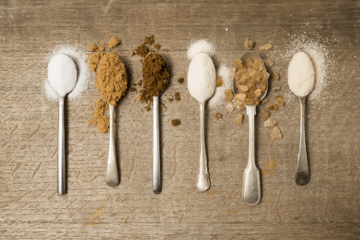Insulin - Reduce blood sugar levels through nutrition

- What is the blood sugar level anyway?
- What are normal blood sugar levels?
- How does insulin work to lower blood sugar levels?
- What are the consequences of constantly high blood sugar levels?
- How stress affects our insulin levels
- What happens when blood sugar levels are too low?
- The top 4 food tips that help regulate blood sugar
- Tip 1: Eat fibre-rich meals that contain a lot of vegetables and are high in protein!
- Tip 2: Choose complex, rather than simple carbohydrates!
- Tip 3: Eat as little fast food as possible!
- Tip 4: Avoid alcoholic beverages!
- Foods that trigger an insulin spike
- Foods that keep insulin low and don’t cause spikes
- The best foods to lower blood sugar levels
- These diets are particularly suitable for keeping your blood sugar levels under control
- Our summary on insulin
- Frequently Asked Questions
- Sources
The number of diabetes diagnoses in the UK has doubled over the last 15 years. The preliminary stage – pre-diabetes – is most often diagnosed due to too high blood sugar levels. But to what extent can high blood sugar levels be avoided and is it a problem if these values fluctuate? Is insulin good or bad and what has it got to do with weight loss?
In this article, we will clarify why your blood sugar fluctuates and how best to proceed!
What is the blood sugar level anyway?

As the name suggests, the blood sugar level provides information about the sugar content in the blood. The glucose content in the blood determines how high the blood sugar level is. Glucose is a naturally occurring sugar, which is a type of carbohydrate. Glucose supplies energy to the body and thus influences, among other things, brain performance and muscle activity.
The body tries to keep the blood sugar level, i.e. the sugar content in the blood, as constant as possible while also keeping it within a certain limit. It is, however, completely normal for the blood sugar level to fluctuate during the course of the day as soon as we eat something, or have phases of increased energy consumption such as during exercise.
What are normal blood sugar levels?
The blood sugar values can be measured and provide information about how high the sugar content in the blood is. The following table shows the expected normal blood sugar level before breakfast and how high it may rise after you have eaten something. For comparison, the expected blood sugar values of a diabetes patient, whereby the blood sugar level would rise to life threatening levels if left untreated.
| Normal (Adult) |
Diabetes patient | |
|---|---|---|
| Fasting blood sugar | 4.0 to 5.9 mmol/l* | ≥ 7.0 mmol/l |
| Blood sugar 2 hours after eating | < 7.8 mmol/l | ≥ 11.0 mmol/l |
* mmol/l = millimoles per litre is the unit of measure used for the concentration of glucose in the blood
How does insulin work to lower blood sugar levels?

The hormone insulin is primarily responsible for the regulation of the glucose level in your blood. Insulin serves as a “door opener” so that the glucose can be converted into energy that can then be absorbed and utilised by your cells.
What does insulin do in the body?
Insulin is produced by the body in the pancreas and is responsible for ensuring that the muscle and fat cells can absorb glucose from the blood.
If you have not eaten for several hours, your blood sugar level will be low. That is why the human body may use alternative energy sources, such as muscle glycogen, to provide energy to your cells instead. However, a high blood sugar level is a sign that we have just eaten something and our blood has been freshly supplied with sugar. After eating, insulin rises to transport sugar to the cells.
How does insulin affect weight loss?
Insulin inhibits the breakdown of fat and triggers the synthesis (storage) of fatty acids. This is quite normal as long as the insulin level is not permanently increased, otherwise more and more fat would be stored, which would lead to obesity in the long term.
A long-term high blood sugar level can lead to obesity.
For example, if you have a lot of sugar-rich foods in your diet, your cells would be constantly oversupplied with sugar. The cells react to this by absorbing less sugar or reacting less well to it. This phenomenon is called insulin resistance and leads to a blood sugar level that can not drop as it should, because the absorption of sugar into the cells no longer works properly. Insulin resistance is a precursor of type 2 diabetes, which is why appropriate countermeasures should be taken to prevent the disease.
What are the consequences of constantly high blood sugar levels?

If the blood sugar levels are permanently elevated, this is called hyperglycaemia. The body then tries to excrete these large amounts of sugar through frequent urination. This excessive loss of water logically leads to increased thirst.This often results in a mineral imbalance and circulatory problems.
Below is at list of hyperglycaemia symptoms:
- Fatigue, weakness, lethargy
- Lack of concentration
- Dizziness
Why can high blood sugar levels lead to diabetes?
People with excess weight often have a disturbed carbohydrate metabolism. If the carbohydrates cannot be metabolised properly, the blood sugar level rises extremely high, which can lead to the metabolic disease diabetes mellitus in the long term.
People who suffer from diabetes have high blood sugar levels, leading to the pancreas secreting insulin in high quantities in order to reduce the high blood sugar levels.However, the pancreas will reach a point where it can no longer meet the high insulin requirement, which is why diabetics often have to inject extra insulin.
Increased insulin levels lead to the storage of fat in the body.
How daily exercise helps lower blood sugar levels

A lack of exercise can cause cells in the body to be less sensitive to insulin. As a result, the absorption of glucose into the cells is impaired, which can lead to insulin resistance. The pancreas has to produce more and more insulin to supply the cells with glucose – but this is not a long-term solution!
Physical exercise draws sugar into the body’s cells, because as soon as your muscles move they need energy, which they take from the glucose reserves in the body. These reserves also have to be replenished afterwards, which is why sugar is transported from the blood into cells again, as a result of which the sugar level in the blood decreases.
Muscle activity not only increases insulin production, but also improves insulin sensitivity by building muscle. This also leads to the body reacting more efficiently to foods that secrete a lot of insulin. People with a high insulin sensitivity need less insulin to lower the blood sugar level than people whose insulin sensitivity is not as pronounced.
In addition to weight training, endurance training are also particularly beneficial when strengthening the cardiovascular system. You can choose a sport of your choice, such as running, cycling or swimming – preferably the one that you enjoy the most and suits you best.
How stress affects our insulin levels

If we suffer from a lot of stress, the stress hormone cortisol is produced by our body in large quantities. Cortisol and insulin are indirect opponents: a high cortisol level reduces insulin secretion leading to a sharp blood sugar level rise, because there is not much insulin available to lower the blood sugar level again.
Too much stress is unhealthy – but also for blood sugar levels!
Another measure to avoid high blood sugar levels is to allow yourself more relaxation and to remove possible stress factors from your life!
What happens when blood sugar levels are too low?
In some people, it may also happen that their blood sugar levels are too low in the long term, although they eat regularly and sufficiently. If the blood sugar level is too low for a long time and deviates from the normal values, there is a cause for concern. Hypoglycaemia can affect the performance of our brain in particular, as it is not supplied with sufficient energy.
Hypoglycemia occurs when too much insulin is produced by the body or diseases interfere with the hormones responsible for increasing blood sugar levels. The following are a few signs that may indicate low blood sugar levels:
- Cravings
- Fast heartbeat, restlessness
- Dizziness
- Paleness
- Shakiness
- Headaches
- Difficulty concentrating
What should you do when blood sugar levels are too low?
Hypoglycaemia in diabetics sometimes occurs as a result of an improper dose of medication. Alcohol can also cause low blood sugar by inhibiting the release of glucose stored in the liver when it is needed. If you exercise too long and excessively, it can also happen that the blood sugar level drops rapidly, which is why you should have a small snack if necessary to replenish the energy stores for a short time.
The top 4 food tips that help regulate blood sugar

The goal should be to increase your blood sugar level as slowly as possible and then let it lower again just as slowly. If this is not the case it could suddenly drop causing the feeling of hunger to also quickly reappear, which can lead to unconscious and uncontrolled snacking.
You have probably noticed after eating a bar of chocolate or gummy bears you are often hungry again soon after.
But how do you control your insulin level so that it does not shoot up and quickly fall again? It is advisable to follow a healthy and balanced diet. Here are our top tips for you:
Tip 1: Eat fibre-rich meals that contain a lot of vegetables and are high in protein!
These kinds of meals keep you full for several hours, which means that you eat fewer snacks. It is better if you limit yourself to a few large main meals so as not to stimulate insulin production unnecessarily often.
Tip 2: Choose complex, rather than simple carbohydrates!
Complex carbohydrates curb your hunger longer and do not allow the insulin level to rise too much.You are also welcome to consider the glycaemic index and the glycaemic load of carbohydrates.
Tip 3: Eat as little fast food as possible!
Reach for whole grains and natural foods rather than highly processed foods as these only cause the insulin level to rise unnecessarily quickly. Likewise, you should avoid sugar and saturated fatty acids as much as possible.
Tip 4: Avoid alcoholic beverages!
Alcohol also contains a lot of calories and additionally ensures that fat burning is temporarily stopped.There is nothing wrong with a glass of wine or a beer from time to time, just try to enjoy it in moderation!
Foods that trigger an insulin spike
Here is a brief overview of the foods that you should avoid as much as possible in order to prevent a rapid and high insulin increase:
- Foods high in sugar and fat – usually very high in calories
- Foods containing saturated fatty acids (e.g. sausages, fast food and other highly processed products)
- Sugary drinks and alcohol
-
Foods that keep insulin low and don't cause spikes
Here is an overview of the foods that you should preferably eat so that your insulin level does not rise too rapidly and fall again:
-
- Foods with low glycaemic index
- Fruits and vegetables
- Whole grain foods
The best foods to lower blood sugar levels

Here are a few insider tips for special foods that are particularly suitable for lowering blood sugar levels due to their composition:
-
- Garlic
- Ginger
- Pulse vegetables, such as beans, peas and lentils
- Cinnamon
- Fruits, such as apples and bananas (not yet fully ripe)
- Whole grains
- Vegetables, especially green leafy vegetables
- Sources of protein, such as lean meat and low-fat dairy products
- Fatty fish
- Olive oil
- Nuts
These diets are particularly suitable for keeping your blood sugar levels under control
If you want to choose a certain diet, the low-carb diet would be a good way to keep the blood sugar level constantly low and avoid strong fluctuations. Intermittent fasting is also a good way to achieve stable blood sugar levels.Intermittent fasting can reduce snacking and can help you lose weight thus insulin sensitivity can be improved.
Our summary on insulin
Even if insulin is often associated with obesity and cardiovascular diseases, it is not harmful to the body – on the contrary! It is necessary to control our blood sugar and ensures that the body is provided with energy when it needs it.
Make sure that your insulin level does not rise and fall too fast – you can influence this with the right foods, exercise and stress management.
Frequently Asked Questions
What does insulin do in the body?
Insulin transports the sugar from the blood into the cells so that it can be used for energy production.
What is a normal blood sugar level?
In a healthy person, the fasting blood sugar (8-10 hours since last meal), should be between 4.0 to 5.9 mmol/l.
What can be done about high blood sugar levels?
You should pay attention to a healthy and balanced diet that contains as few sugary and high fat foods as possible. In addition to choosing your food, you should also make sure to exercise or keep your daily activity high and avoid stress as much as possible.
Sources
- https://www.nhs.uk/conditions/high-blood-sugar-hyperglycaemia/ last accessed on 15/02/2023
- https://www.diabetes.co.uk/diabetes_care/blood-sugar-level-ranges.html last accessed on 15/02/2023



